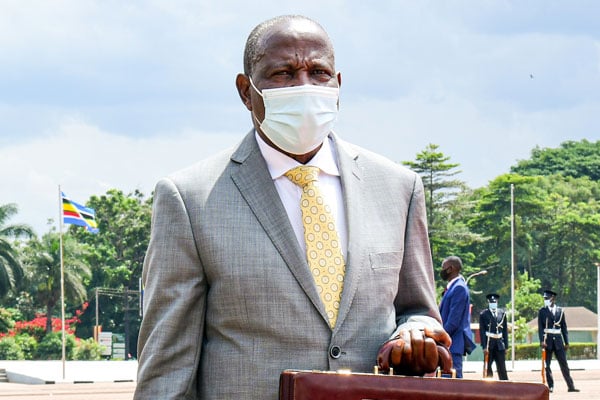Prime
New budget must cut cost of living – experts

Finance Minister Matia Kasaija arrives for the Budget reading ceremony at Kololo Ceremonial Grounds in Kampala last year. PHOTO/DAVID LUBOWA.
What you need to know:
- Finance Minister Matia Kasaija is expected today to detail the government’s revenue mobilisation and spending plans for the next 12 months.
The 2023/2024 Budget due to be read today should address the increasing cost of living if it is to make sense to ordinary Ugandans, according to economists and households.
Dr Brian Sserunjogi, an expert with the Economic Policy Research Centre (EPRC), and Dr Fred Muhumuza, an economics scholar and practitioner, separately said prices of groceries are likely to remain high despite latest good news of reducing inflation.
According to Uganda Bureau of Statistics (Ubos), inflation over the past month is down by 1.8 percentage points to 6.2 percent, itself a drop from the double digits last October.
The government has explained the rising commodity prices away as a result of exogenous factors; global after-effects of Covid-19 pandemic and Russia’s invasion of Ukraine, which has choked international supply chains.
Finance Minister Matia Kasaija is expected today to detail the government’s revenue mobilisation and spending plans for the next 12 months during a state event at Kololo Ceremonial Grounds in Kampala.
He will be reading the Budget for the new financial year, which starts on July 1, at a time Uganda Revenue Authority (URA) is struggling to close the 2022/2023 revenue target gap and prices of groceries and fuel are higher than a year ago.
“I can tell you the prices we have now are going to be the new prices,” Mr Muhumuza, said, adding, “Households need to get used to the new prices. This means tightening your belt and considering the new prices as new normal.”
Except in a handful cases, the higher prices have not been matched with pay increases by the government or private sector employers, meaning the value of salaries measured by the basket of goods it can purchase, has been eroded over the months.
In short, an income earner presently buys less with same or higher income than last year, offloading what they can no longer afford, which cumulatively waters down their quality of life.
Experts and ordinary citizens interviewed for this article said thousands of Ugandans who lost formal jobs as employers squeezed by Covid-19 disruptions downsized, have found no replacement employment or alternative income sources, suggesting more Ugandans than before are living hand-to-mouth.
EPRC research fellow Brian Sserunjogi, in a recent interview, argued that price of several commodities and services are likely going to continue rising because the variables are beyond government’s control.
These, he said, will escalate poverty in the country.
On his part, Mr Muhumuza said what is reducing is the rate at which prices are increasing, but not the actual pricing coming down, meaning whatever is on the market will remain expensive for buyers with stagnated income.
The acting Bank of Uganda Governor, Mr Michael Atingi-Ego, rendered similar explanation last week when releasing the latest Central Bank Rate, the rate at which the bank lends to commercial banks.
The CBR is important because it influences interests that financial institutions charge on loans, thereby determining how cheap or expensive credit is for domestic investment.
It is also a fiscal control tool because higher interest rates discourage borrowing, which in turn reduces money available in circulation, and inflationary tendencies if cause is excess money supply.
“The issue right now is not so much about the prices coming down, but the rate at which the increasing prices are reducing,” the BoU Governor said, “The prices are still rising, but the rate is coming down.”
Mr Stephen Kaboyo, the managing director of Alpha Capital Partners, said the welfare of individual households depends on their income levels.
“If prices are rising and your earnings or income remains static like it is right now, then there is no way you will feel the impact of the prices that are coming down so slowly,” he said.
The government, nonetheless, has struck a more optimistic tone, with the President declaring in the State-of-the-Nation Address that the economy will in the next financial year grow by 6-7 percent, up from the 5.3 percent Ubos confirmed early this month for the ending financial year.
In a separate earlier interview, Mr Patrick Ocailap, the Deputy Secretary to the Treasury, said: “Technically speaking, inflation is still there, and that is expected. But we will find a new equilibrium and stability, although it may not be the same because prices could be slightly at a level higher than the pre-Covid-19 equilibrium.”
Some analysts hold the view that with just the debt servicing set to consume the largest share of the Budget, light at the end of the tunnel will continue to be dim until government controls its appetite.
Mr Julius Mukunda, the executive director of Civil Society Budget Advocacy Group (SCBAG), said the success of the National Budget will depend on “nothing but how it is implemented”.
He called for budget discipline and spread of service delivery across the country.
Mr Mukunda said the government’s excessive borrowing internally is crowding out local investors and businesses from accessing affordable credit, while repayments delays mean money is unavailable to move around to those who need to support enterprises, thereby stifling employment and economic growth.





